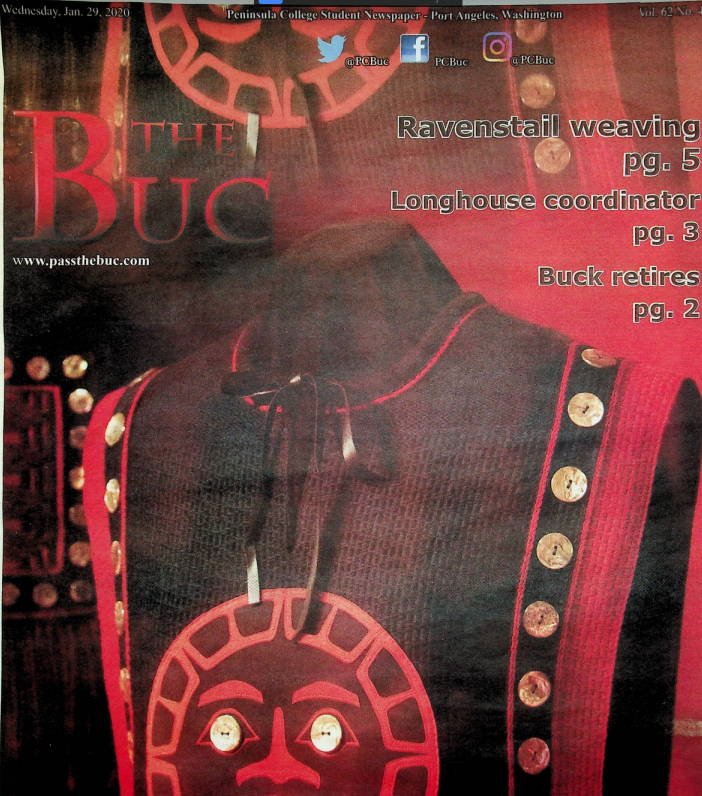
Solutions sought out for scheduling conundrum
The class schedule at Peninsula College “really limits me and 1 end up taking classes I don’t really want to take just be-
cause ofrequirements and conflicts keeping me from taking the classes I want,”said Logan Matlock, current student who is pursuing an Associate in Arts Honors Degree. However, Elita Nivens, student, said that she has never actually experienced difficulties with class scheduling, but she knows many students that have. The majority of the classes at Peninsula College are scheduled between 9:10a.m. and 12:30 p.m.“Classes that are offered in the morning tend to fill up more than the afternoon classes,” Janet Lucas, outgoing dean of arts and science and Basic Education
for Adults said. There is no denying that morning classes are more popular than those in the afternoon, but this cramped scheduling can give students a hard time. Matlock said that if there are any scheduling conflicts, which there often are, it is nearly impossible not to miss a class you wanted or needed one quarter
and having to wait a quarter or even a year. “Some people choose to take on-
line classes to work around this. I know I have,” he said. According to Washington State Board for Community and Technical Colleges (SBCTC), Peninsula College has a total number of 1,993 Full-Time Equivalent Students (FTES) as of 2018-2019 academic year. FTES is the equivalent of one student for 15 community college credits
per quarter, as stated by the State Board. So what does the class scheduling at another college with the same number of FTES look like? As reported by SBCTC, Grays Harbor in Aberdeen has 2,049 FTES, and Grays Harbor’s class scheduling is similar to PC’s; most classes are scheduled in the morning with not so many sections for each class. On the other hand, colleges such as Bellevue with 12,107 FTES have many sections of the same class offered in the morning, afternoon and evening. Sharon Buck, vice president of instructions said that there is a reduction in student registration right now that probably makes it difficult for students to find more classes than it was three years ago.
“Most ofthat is due to the fact that we have fewer students than we had three years ago. It is unsustainable for us to offer classes that are really small. If three people want it and they may want it so bad, but we can’t offer a class with three people in it. There is no rule, per say, of what bottom number is for a class. But if the class has a cap of 30, it has to have at least 12 to 15 students to run,” Buck said. Nivens said that she knows of an international student who had to graduate a year later to take one class that was only offered in the spring. International Student Success Naviga-
tor Norma Gorham said that she would like to see more Face-to-Face classes, which can be very beneficial for international students with F-l Visa in particular with the strict requirements for online classes.
“I think we have trouble finding enough Face-to-Face classes that will meet their requirements because as an International Student, you have to have ten credits that are Face-to-Face for every one online. So sometimes we have trouble getting the right balance,” Gorham said. Although this is an issue that Gorham is indeed seeing that Buck is also aware of, Buck said that she knows this can be pretty frustrating in some ways. One area where we have always tried to make sure that we serve is whether the class is online or not, Buck said. She followed that International Students, and also the Servicemen and Servicewomen are those that need more Face-to-Face classes in comparison to
online classes. As for veterans, they cannot take all online classes or their benefits will not follow them, according to Buck. However, the college also has to take domestic students with a full-time job, a household to support, and athletes into consideration. They, on the other hand, utilize online classes. “We always make sure that for any one class that is needed in popular programs like business, then we have at least once a year that is offered Face – to – Face, and not to have 100 percent online,” Buck said. The class Schedule is created based on historical data as of now. Deans look al what the last year’s schedule was like, determine whether it was working or not, and fix what-
ever problems there were. Matlock said he would love to see improvement in advising that looks a little further forward and accounts for scheduling conflicts. This is something that is not very well known, but Deans have an annual class schedule that they can access online. Flence, when creating an academic calendar, Deans and Buck encourage students to come talk to them if they would like to see information that is a little ahead.
This should help with scheduling conflicts and being uncertain ofwhat’s ahead. Buck also suggested students to make the most out ofthe add and drop system when registering. Even when the class is full, there can be an additional section when the waitlist reaches a certain number. Lucas said that Nutrition class is an good example ofthat, and additional sections would appear once in a while, for it having a high demand. “I don’t want students crying in the
woods,” Buck said. Quarterly academic advising for class registration will improve for the better as
well, as a faculty adviser that is familiar with a student’s Area of Study and Student Services’ adviser will advise together. This doesn’t happen for the upcoming advising for spring quarter, but it is planned that it would happen for fall quarter advising.
There will be a huge improvement in the overall class scheduling with the new ctcLink, and that is expected to be put in use from Fall Quarter 2020. With the ctcLink, “as we get on the Guided Pathways, it’ll show us how many people are in the Pathway, it will be able to reveal how many ofthem are wanting
to take statistics class next quarter, and that will allow us to adjust the number ofsections we offer to the number ofstudents who needed,” Buck said. Furthermore, each student will have an account on the ctcLink, and they will have necessary information including annual class schedule.
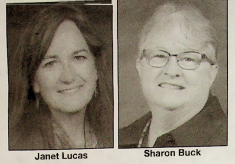
Briefly
Writing lab open for winter quarter
Writing need not be a solitary or agonizing process:the writing lab,room B137 in the library, is open for the quarter. Tutors can help with any aspect of the writing process except copy editing and proof reading, and in all genres including personal projects and applications as well as assignments. Until March 5, the schedule will vary by day: Monday 11am to 4pm, Tuesdays through thursdays 9 am to 2pm, Friday 9am to 10 am. March 5 through 19, the Lab will be open Monday through Firday 9am to 3pm.
Studentscan sign up for a 30 to 60 minute session in the appointment book found on the right corner of the Library’s front desk or by calling (360)427-6361, Alternatively, students can access online tutoring at https;//bit.ly/203p9tz.
“Our goal is to foster better writers rather than merely better papers,”
says John Anderson, Writing Lab and eTuroring Coordinator.
The annual Flag of Nations Ceremony
Flag of Nations Ceremony will be held at the Pirate Union Building Jan.
30 11:30 a.m. to 12:30 p.m. “Come join us for some fun, food and celebrating with the Peninsula College International Program,” said Jeremiah Johnson, assistant athletic director said.
Scholarships available
Applications opened for scholarships on Jan. 22. Visit www.theWashBoard.org to update or create a profile. Then type in “Peninsula College” and work on the application of your choice. Additional in-
formation about Peninsula College Foundation scholarships, application instructions, eligibility, and more, isavailable at https://pencol.edu/schoarships.
VP of Instruction retires
By Saki Kambe
Solutions sought out for scheduling conundrum twice a year that is offered Face-to-
Peninsula College Vice President of Instruction, Sharon Buck announced that she will retire in April due to family health concerns, according to PC officials. “Family needs come first,” Buck said. “I am sorry to go, but know it is necessary. We have a lot to accomplish in the short time before I leave, and I have faith that we can accomplish most of it.”
Peninsula College will immediately begin it’s search for Buck’s replacement, and hopes to complete a successful search by mid-April.
Buck says she knows that the college will continue their work in assisting students achieve living wage jobs, improving the local economy, and the future of the region.

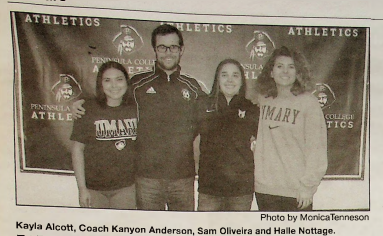
Women sign letters of intent
By Monica Tenneson
The Peninsula College Women’s Soccer team had their athletic signing on Friday Jan. 20, 2020, where Kayla Alcott, Sam Oliveira and Halle Nottage were the first female sophomores to sign national
letters ofintent to play, this year.
Alcott is from Ewa Beach, HI. Nottage is from Kailua-Kona, HI. Oliveira is from Porterville, Calif. The Associate Dean for
Athletics and Student Life, Rick Ross said that when athletes come to Peninsula College, it is in the hopes they will play
for two years then move up to the next level. The players are heading off after
this next season to their new schools. Oliveira was, according to Ross, “Peninsula’s leading scorer in 2019 and North Region most valuable player.” She will be starting as a Junior on the Vikings soccer team at National Collegiate Athletic
Association Division 1 Portland State University. Alcott and Nottage will both be attending the University of Mary, and will play on the National Collegiate Athletic Association Division II, located in Bismarck, N.D. “These three have done a great job ofrepresenting the college both on and off the field,” Head Coach Kan-
yon Anderson said. Nottage expressed multiple reasons for her choice of signing with the University of Mary. She said that the University of Mary has a Communications program that she feels will suit her educational
needs. She is also looking forward to the new line of players that the school is signing for the women’s soccer team.

Pirate Pantry gains approval
By Saki Kambe
The Pirate Pantry, Peninsula College’s food pantry, became the first college to be approved as a site for Food Lifeline, according to Rick Ross, associate dean of athletic and student programs, Rick Ross. The Food Lifeline staff made a site visit last December and approved the college on the spot.
Food Lifeline is a Non-Profit Organization that has been providing food to 300 food banks, shelters, and meal pro-
grams across Western Washington for more than 40 years.
“This will open up an opportunity for a greater level of support from the Port Angeles Food Bank,” Ross said.
While the college is gaining support with the Food Lifeline approval, the Associated Student Council is continuing to support the Pirate Pantry.
A food drive is planned for winter quarter. The decided date are from Feb. 3 through 14. Further details will be announced soon.
Additionally, in reflection to the opening and the first quarter of serving campus community with the Pirate Pantry fall quarter, Ross said that day-to-day grab-and-go items have been popular. “It has been a challenge to maintain
inventory.
“That tells me that a large number of students are hungry during the day and I’m very happy we are able to address that need. Otherwise, the Wednesday pantry opening seems to be working, along with
students’ ability to schedule visits with the ASC at other limes,” Ross said.
• Pirate Drop-in Food Pantry is available to current students at ASC office Tuesday through Friday, during ASC
office hours posted in front of the ofice, as grab-and-go supplies last.
Pirate Pantry is open 11:30 a.m. to 2:30 p.m. Wednesdays at room J-52. If students cannot make it to the pantry operating hours, they can contact the ASC at
asc@pencol.edu and make
a special arrangement.
Port Angeles Food Bank is open Mondays, Wednes-
days and Fridays 11a.m. to 3:30 p.m. The food bank is
available to all the Clallam County residents. The food bank is located at 402 S
Valley St, Port Angeles, WA
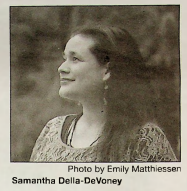
New Interim coordinator
By Monica Tenneson
Samantha Della-DeVoney recently took over the position as the Interim House of Learning, Longhouse, Coordinator. Sadie Crowe was the previous
Longhouse coordinator. Crowe was the coordinator since 2014. The position includes coordinating events and art exhibits to be held in the Longhouse. Last Fall Quarter, Della-DeVoney co-taught indigenous humanities with Kate Reavey.
The Longhouse is available for students to study individually or with study groups. There are regularly scheduled
art exhibits displayed in the entryway
ofthe building. Community members as well as students can learn more about the Native American culture, attend cultural ceremonies or other events and view art-work from regularly hosted artistic displays.
Della-DeVoney brings in a strong connection to the Native American roots that The Longhouse was created from, as
she is a part ofthe Makah Tribe. Art and native American culture have been a big part of her life. Growing up, her mother had an art shop on the Makah reservation in Neah Bay. She spent a big part of her childhood in that shop. A lifestyle rich in Native American customs gives her a direct pathway to many necessary
skills and knowledge that will benefit the needs of this role as the Interim coordinator.
Over the years, Della-DeVoney went through different programs of study at PC in search of her inspiration to guide
her towards her desired career path. She explored the health feilds as she has the intention to bring peace and healing to others. After getting an Associates in Arts at the college, she went on to obtain her Bachelor’s Degree in the Native Pathways Program at Evergreen Slate College. This brought her to the Longhouse for two years as she attended the program through The Longhouse. Hosting it there allows for students to have more
accessibility to the program, rather than going to Olympia. The program used to be known as “The Reservation Based
Community Determining Program.” It gives indigenous people an easier way to access higher education.
This coming Fall she will be starling a Master’s program with the focus being on Public Administration. She has a
dream to start a Non-Profit organization for Healing. Her intentions are that it will be for anybody, and it will, “be steeped in indigenous practices,” she said. Della-DeVoney graduated June of 2019.
She spends her free time in nature, connecting with the land and making plant medicine. She also makes jewelry, enjoys dancing and basket weaving. Traveling to Peru once a year over the
past five years has helped her discover a greater appreciation for nature.
The Longhouse was created by six local Native American Tribes: Makah,
Jamestown, S’Klallam, Lower Elwah Klallam, Port Gamble, and Quileute. In 2007,’this Longhouse opened its doors
and was the first creation of its kind, being the first Longhouse to have been built on a community college campus.
There are many uses for the Longhouse in ways to bring the community together, celebrate art and education as well as understand and appreciate the history of the Olympic Peninsula.
Della-DeVoney has many visions for what she hopes to bring to her new position. She would like everyone who
enters to feel welcome and comfortable. Her hopes are to bring more awareness about the Longhouse to the community as well as its purpose al the college.
Della-DeVoney wishes to show what a helpful resource it is and how it could be
even more so. Although she considers herself“holding space” for the position, her hopes are that she can continue to bring more culture and positive attention to the Long-house while keeping it grounded in the Native American roots it was created in the spirit of.

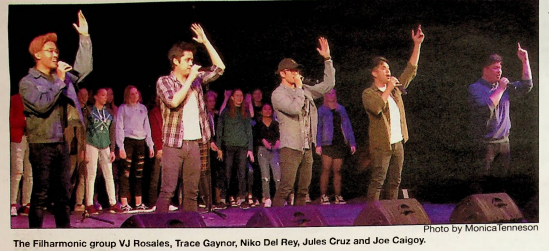
ASC Hosts the fundrasing Filharmonic concert
Review by Monica Tenneson
The Filhannonic took the stage in January in the Port Angeles High School auditorium The Filhannonic is a Filipino-American, all-men a capella group, based on Los Angeles
They are best known for their performance in the hit movie Pitch Perfect 2. They started at 7 p.m. and performed until
8 p.m. This performance was put on by the Peninsula College Associated Student Council.
The ASC has a specified budget. A certain portion ofthat is set aside for bringing in entertainment and performances like this one. They ended the evening with bringing the PAHS choir on the stage to join them in entertaining the rest of the about 350 attendees.
This performance sold 131 tickets, earning $2,645 in total sales.
The two-feet of snow leads to the three-day campus closure
By Saki Kambe
Peninsula College Port Angeles Campus had a two-hour delay on Monday, Jan. 13 and was closed Tuesday, Jan. 14 through Thursday, Jan. 15 as a result of the heavy snow. The campus them opened again on Friday, Jan. 17, PC Campus Security said.
The maintenance crews had worked hard trying to get rid ofthe snow, but the campus needed to re-
main closed for few days to ensure students’ safety. “The roads were not safe for students to travel to campus. This also included traversing around campus,” Campus Safety said.
As far as the impact the heavy snow left for students, “online classes were not as affected because many students have access to Canvas at home,”
Campus Security said. “Missing a week of school is fun but keeping on a schedule without disruption
allows students the opportunity for greatersuccess.” “Tune in to all forms ofsocial media for closure information. You should also be receiving notifications via PC Alert and can find updated information on the PC website. Ifyou are not receiving PC Alert notifications, please ensure your contact information is updated through Pirate Central or contactCampus Safety,” said Campus Security, in case it snows again.
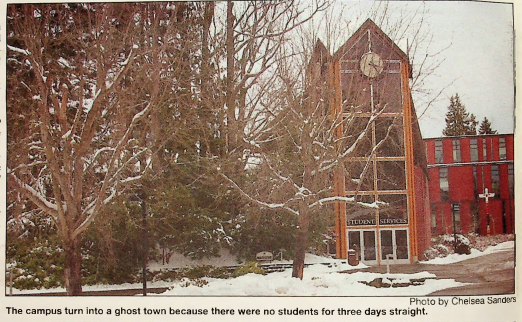
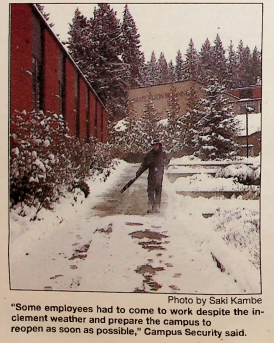

‘Whatever affects one directly affects all indirectly’
photos & story by Emily Matthiessen
In justice anywhere is a threat to justice everywhere. We are caught in an incapable network of mutuality, tied in a single garment of destiny. Whatever affects one directly, affects all indirectly,” Martin Luther King, Jr, “Letters From a
Binningham Jail.”
Multimedia artist, attorney and advocate for social justice reform, Deborah Espinosa, spoke to the Studium Generale audience at the Little Theater on the subject of legal financial fees (LFOs) imposed on convicts and the repercussions there of for people already struggling with societal and personal issues when released. She also narrated a history of the importance of photographers in effecting social and legislative change. Espinosa said that to effect legal change, society-wide opinion must first be changed.
Nearly one third of Americans have a criminal record, so the issue of post-prison debt and the difficulty of finding a job and affordable housing affects a large percentage ofthe population.
Espinosa’s Jan. 23rd presentation was part of Peninsula College’s Dream Week. Martin Luther King, Jr’s focus on social
justice, including prison reform, and his deep understanding that in a truly free society every citizen would have equal
rights and opportunity, regardless of wealth, stature, or heredity continues to inspire activists and reformers.
Espinosa’s presentation connected with the Dream Week showing of Ava DuVemay’s “13th,” about the 13th Amendment to the Constitution, intended to end slavery, which had language within it that has given cover for prisoner abuse and unjust incarceration. The 13th Amendment states: “Neither slavery nor involuntary servitude, except as a punishment for crime where of the party shall have been duly convicted, shall exist within the United States, or any place subject to their jurisdiction.”
Espinosa is dedicated to the Living With Conviction Project, found al https://www.livingwithconviction.org/, and with a coalition of organizations and individuals successfully lobbied the Washington State legislature to eliminate the 12 percent interest on LFOs for those convicted on or after June 17th, 2018.
This was a partial victory, as there are legal hurdles involved with getting it discharged retroactively, and there is still 12% interest attached to victim restitution. Espinosa said that the average minimum for LFOs is $2500 per person,
which will double after seven years in prison, wherein wages are less than a dollar per hour.
Espinosa befriends, photographs, and records the stories of people who have served their time and dealt with crippling debt after release, as seen in a magazine for lawmakers, her websites, photography exhibitions, and a documentary movie in progress. Her work has been instrumental in helping legislators and citizens understand the challenges convicts face when attempting to become productive members of society.
“There are many examples of media reaching decision makers, legislators, and causing change… there’s an enormous amount of historical experience… now it’s no less impactful.”

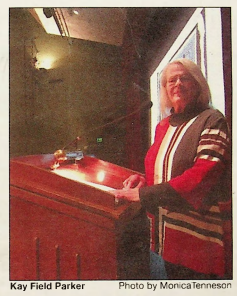
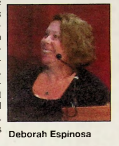
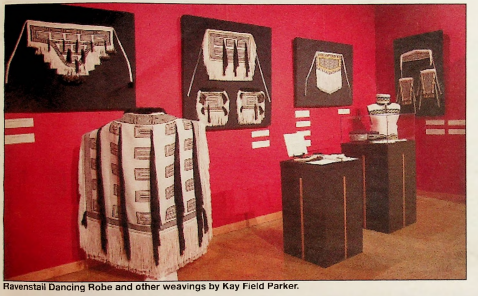
Ancient patterns and modern weaving on display in Longhouse
“The art of weaving is a profound metaphor for understanding the workings ofthe universe and our place in it.
Through the physical process of weaving, we gain a beltter understanding of this world and how we as human beings
are woven into it,” Susan Barrell Merritt,
“The Art of Weaving a Life.”
Photos & story by Emily Matthiessen
Throughout human history weaving has been an essential domestic skill and a symbol of the deeper, more mysterious aspects of life. How the symbols are interpreted, and with what emphasis, depends upon the culture the weaving has been developed by, but could there be a complex pattern that connects all weavers, and thus their communities, through time? The current exhibition in the Peninsula College House ofLearning, Long-house, is a tangible connection between weavers ofthe past, the present, and the future. It features the Ravenstail and Chilkat weavings of Kay Field Parker, a master weaver and teacher highly involved in the revival ofRavenstail weaving, which lay dormant for over 200 years.
Parker’s teacher, Cheryl Samuel, is credited with rediscovering the techniques necessary to create the Ravenstail weavings of the Pacific Northwest Coast. Once they were reintroduced, an ever-expanding group of weavers have learned, collaborated, and taught the skills.
Parker visited the Port Angeles campus in January and gave a presentation in the Studium
Generale, a free lecture series open to the public. “This program was made possible through generous contributions to the PC Foundation by a couple who wishes to remain anonymous,” said Kate Reavey, Studium
Generale Instructor. “These donors have created this opportunity as well as other programming that required
additional funding. We are deeply grateful!” Kay Parker detailed some of the history of the Chilkat
and Ravenstail weaving and its rejuvenation, her own history oflearning and weaving, the technical aspects of the
weaving, and the process the ancient weavers used to gather and dye the mountain goat fibers previously used. This and other Studium Generale lectures are recorded and available for viewing in the library.
Parker has returned to her home in Juneau, Alaska, but her work remains in the Longhouse until March 27th.
Weaving is a contemplative practice,and masterworks like these take a lot of time to complete. “Time indeed was
needed to weave a ceremonial garment. The weaver was likely a professional
craftsman who inherited the privilege of weaving from her mother or grandmother.
The twining of a dancing blanket took many hours to complete. Daily progress
was comparatively slow: a good weaver could complete a small face in about ten hours. Combined with
the work of gathering and preserving the summer’s harvest, and of daily responsibilities to the family, it would take a woman at least six months to finish weaving a Dancing Blanket,” Cheryl Samuel,
The Chilkat Dancing Blanket. Chilkat weavers are known for their perfect circles, a phenomenon not previously seenanywhere in the weaving world.
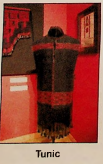

Weaver:Connections through time
In the process of researching and writing this book, Samuel became interested in the mysterious story of the
Ravenstail weavings, which feature geometric patterns and a core palette of white, black and yellow. Samuel
ended up chasing the story to Soviet Russia, Europe and across North America. Through diligence, patience, contemplation, and an eye for detail she unraveled the weavings with her mind. The story ofher search and details about the preparation of materials, the techniques involved, and a description of each of the 15 examples
of Ravenstail weaving available from ancient times, are in her book Raven’s Tail Weaving which can be found
in the campus library along with her first book.
Parker explained the connection between the two styles this
way, “Both Ravenstail and Chilkat weaving are done with two and three strand twining. The geometric patterns of Ravenstail weaving evolved into the curvilinear forms ofChilkat weaving when the weavers learned
to catch the braided weft strands on the surface of the weaving instead of catching them behind the warps.’ In the recording, also found in the library, Parker tells students about the adaptions modem weavers had to make,
given the differences in yam and dye available in modem times. Kay Parker attempted several
times to take a class from Samuel, but at first it did not work out. “…So I bought Cheryl’s Ravenstail book and for the next two years it was my bedside book. I read it from cover to cover
several times, and intellectually, I knew every technique. When I was finally able to take a
class from Cheryl, I hit the ground running. And after weaving a few pieces, I was able to join a group of weavers that were weaving a Ravenstail Robe for the Alaska State Museum in Juneau. Over the next three years, a core group of seven weavers wove one of the first Ravenstail
Robes to be woven in over 200 years.” Parker was one of the founding members of the Ravenstail Guild, which is now flourishing at 100 members, and is currently the President. The Longhouse encourages students and community
members to visit the gallery to see traditional and modem pieces, ranging from a complete Dancing
Blanket to a purse that can be touched. Gallery hours are
Tuesdays and Wednesdays from 10 a.m. to 1 p.m., and
Thursday 10 a.m. to 12 p.m. and 3 p.m-5 p.m.
Netflix’s “Cheer” Redefines stereotypes
Review by Halle Nottage
When someone says “cheer-leader,” it is typical for the perfect-bodied, blonde-bombshell, pompom waving ditz to come to mind. The ever-present sideline performer yelling, “go team, go!” while jumping up and down in
their tiny mini skirts and crop tops.
However, after watching the mini docu-series “Cheer” on Netflix, my entire perspective on what it means to be a cheerleader changed.
This six-episode series follows the journey ofthe nationally renowned, tiny Navarro Community College cheer team out of its tiny town ofCorsicana, Texas, on their way to the national cheerleading competition in Daytona Beach, Florida.
Despite being from a junior college, Navarro CC has won 14 National Championships, 13 during the filming of the show, as well as five Grand National Championships, making them somewhat of an enigma amongst
the cheerleading community.
So, the pressure was very much on during the making of this series to capture their 14th
title. Throughout the series, the private lives ofseveral ofthe cheer- leaders are looked into, as well as the coaches and several other people whose lives were more or less oriented around cheer.
This gives an incredibly interesting perspective on what it means to be a cheerleader, especially when it comes to the idea of being “perfect,” as it becomes evident that many are far from it yet still manage to be the best
they can be for their team and themselves.
Furthermore, the show helped redefine the idea ofwhat it means to be a cheerleader, and helps
show the true, real and talented athletes that they really are, rather than the stereotype that so
many believe to be true. It puts on display the sacrifices they make in order to become the
best athletes they can, as well as the best people they can be and is
a wonderful ode to humanity and athletes as a whole.
All in all, I would highly recommend this series to anyone. It speaks to what it is to be a
true, raw athlete, what it means to make hard sacrifices, how to overcome all types of adversity,
and ultimately what it means to be a cheerleader.
This show does a beautiful job piecing together the journey that this team goes through in or-
der to compete at Daytona, and puts on display the brilliance of their athleticism, and ability to
get through anything, making it incredibly inspirational.
The show “Cheer” is not just for cheerleaders, it is for anyone who wants to learn what it means
to be a driven, cutthroat athlete, and for that reason alone, it is a show for everyone.
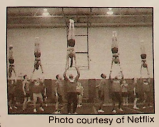
Movie Review: “One Child Policy’
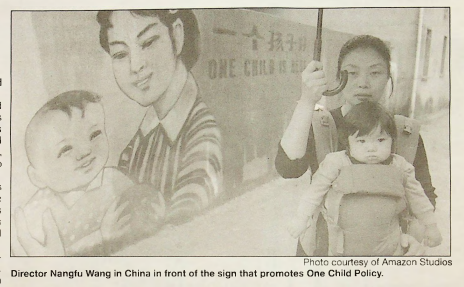
Review by Saki Kambe
Whenever 1 finish watching movies that are disheartening, I always get this “meh” feeling, then I question whether watching the film was a good choice. Most of the time, I cannot articulate my thoughts very well, either.
While I need to admit that this movie, “One Child Nation,”did in fact, leave me with a certain level of grief, it was “what-ever” because if it weren’t for this movie, I would have been missing out on so much that
happened during that 35 years in China. I’m relieved that I am finally up to date on China’s population control plan.
“One Child Nation” is about China launching the One Child Policy in 1980, which ended five
years ago in 2015. For those that don’t know, One Child policy forced all the families in China only to have one child per family. The exception were rural areas that needed workforce for
farm work.
The whole purpose of this policy was so that the nation won’t starve from overpopulation, which was expected to happen if the population kept increasing.
One Child Policy was an odd policy I learned about in history textbooks in middle school. I
never gave it another thought. and it never came to my mind more or less than that. However, this documentary film walks you through what happened during that 35 years, in a series of interviews with Chinese people that lived with that policy. The interviewees were the Directorm Nanfu Wang’s family members,
the officials that carried out the order, and a couple that have
been researching the policy for over 10 years.
Wang flew to China with her son to interview only with her video camera that was not for
professional use. Other staff didn’t come with her so she could get the raw voices from people. This made the film engaging as it captured first-hand tension between interviewees
and Wang’s standpoint.
Revealed were the long-timeuntold, real and harsh stories that haven’t been public about
China’s success in putting a lid on its overflowing population. I have to say all this that went
on behind the scene needs to be heard, no matter how sad it can feel.
Watching this film will help you perceive the One Child Policy in ways that you haven’t
before. As much as this sounds cliche, there is no denying that is was a traumatic social experiment that China launched, and this will remain as truth whether we like it or not. I highly recommend watching it to educate yourself further on the policy. One Child Nation is an Amazon Prime Original movie, so it is only available on Amazon
Prime Video.
Campus Voices: What do you think about the Census? Or why do you think its important?
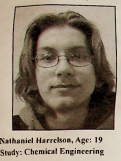
I don’t know much about the Census, besides the fact that it’s
helping keep track ofthe amount of people here or who are at least
here legally. But also, it gives us business on the percentages, who’s male, who’s female. It gives us a lot of
statistics about the population, which can come in handy when we think about economics, our
society, such as people below the proverty line, or how many people are using a motorhome
as their house or their place of residence.

It’s important to have a Census for a couple ofreasons. One is to get a count of the people
living in each area. That for one determines the number of congressional seats that end up being voted into the house of representatives in Congress.
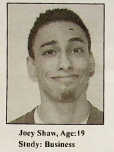
I think the Census is important because there are a lot of people taking advantage of our
system. While there are people working hard and paying taxes, those taxes are being taken advantage of by the people who could be working, but instead are just taking what they can from government programs and
assistance.
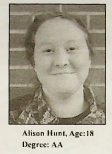
It’s important for the government to know how much money they can spend on each individual and who needs the assistance. Also if you are having people
come visit and a plague begins in that area, they can figure out how, who or where it was transferred from.
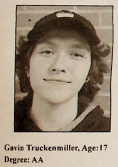
It’s important just to know how much service to provide and to
whom and where.
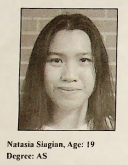
I think it’s important because that way the government can control what happens in each household or to make sure everyone in each house is taken care of. Also to control any illegal entrance into the United States so the government can know where each person is from.

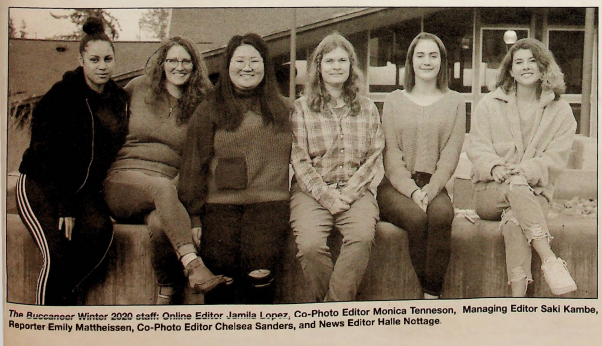
Lady Pirates on their way to success

By Halle Nottage
The Peninsula College women’s basketball team is currently 17 games deep into their season and holds a record of
Il wins and six losses. The returning North Division Champions have been doing quite well during this regular season, particularly after battling through quite a tough preseason in which they faced several NWAC Tournament teams, including the 2019 Northwest Athletic Conference champions Wenatchee Valley.
The lady Pirates currently have eight games left until they enter NWAC play-offs, which will begin on March 8th.
Head Coach Alison Crumb has a positive take on the season thus far, “I think lt’s been going pretty good, we’ve had
some learning moments, obviously. I think we’ve had a couple games that’d we’d like to say that we won that we
didn’t win, but we learned a lot from them and have grown.” This is Crumb’s ninth year as the head
coach of the PC women’s basketball team, and her ninth year of championship
chasing. The last time the PC women’s team lifted an NWAC trophy was in 2015 under Crumb’s leadership, a moment the team to be relived again this upcoming March.
However, there is still quite a ways to go. Crumb had several things to say, about success this season. “Just learning
from our mistakes. We know who we are, we won’t change too much in a month, but we have to sharpen what we do, eliminate mistakes, make sure we’re good with time and score, and ingame things.”
The lady Pirates picked up another win against Everett this past Saturday, which was an important three points to
gain in their hopeful return to the North Division title.
In regards to the win and their eventual improvement, Crumb noted, “Learning from games like this, or losing on Wednesday, and just making sure that when we see these teams again that we’ve improved more than they’ve improved, and just make sure we’re as sharp as we can be come March.”
This season has also brought several players into the spotlight for the team, with Crumb first and foremost acknowledging that their current record is a result of a full team effort, with everybody contributing to its success thus far.
However, she did note that there are several individuals who’ve come forward with their best and have been keys to the team’s success. “Lei is our leading scorer, so she takes on a lot. She plays a lot ofminutes, often she guards the better guards.”
Leilani Padilla, sophomore, and has put many points on the scoreboard for the Lady Pirates this season, as a team
leader she is one of three captains.
In addition to Padilla, Crumb acknowledged sophomore Logan Luke. “Logan works incredibly hard, and
she’s so tough, she’s probably our best defender, and her leadership qualities are
just awesome.” Luke is also a captain this season, alongside Padilla and Cassandra White, who is also a sophomore. Crumb’s returning sophomore class has been quite strong this season, but ultimately, she said, “the team is at its best when every-one is contributing.”
The lady Pirate’s next home game is on Feb. 5 at 5 p.m. against Bellevue college in the gym.
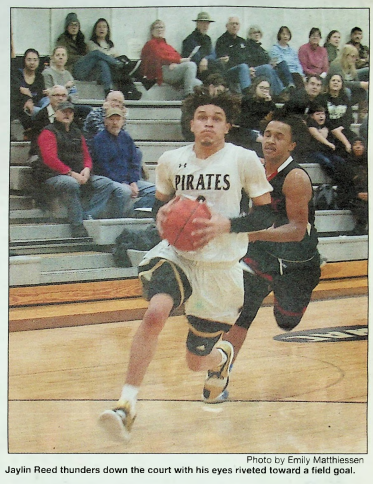
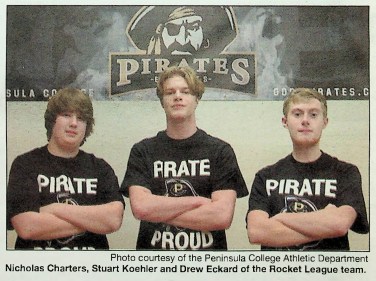
The Rocket League team posts first win
By Saki Kambe
“The Rocket League team of Nicholas Charters, Stuart Koehler, and Drew Eckard posted a historic first win in the inaugural season of Peninsula College esports competition Thursday, stopping Zero Conditions 3-0 in dominant fashion,” said Rick Ross, associate dean of athletics and student programs.
Head Coach ofthe esports team Charlie Morrow said that the three players have worked so hard on improving their communication, mental game, and defense for the past few weeks. “It’s definitely paid off,” she said.
The Pirate trio are l-l in Black Line Championship Series play and take on the University ofConnecticut on January 24,
Ross said. Peninsula College, which has teams competing in Overwatch, League of Legends and Rocket League, is completing its esports arena, which is shared with media classes, and plans to invite fans and begin
streaming games this quarter.

Managing editor
Saki Kambe
News Editor
Halle Nottage
Online Editor
Jamila Lopez
Photo Editor
Chelsea Sanders
Monica Tenneson
Reporters
Emily Matthiessen
Instructor/Adviser
Boneita Smith
Program Assistant &
Business Manager
Boneita Smith
Contact The Buccaneer
Room A-l
1502 E. Lauridsen Blvd.
Port Angeles, WA 98362
Email
thebuccaneer@pencol.edu
Website
www.passtliebuc.com
Phone
360.417.6470
Facebook
wmv.facebook.com/pcbuc
Twitter
www.twitter.com/pcbuc
The Buccaneer is produced
by the Peninsula College
Journalism students as a pub-
lic forum.
Materials published in
The Buccaneer are the sole
responsibility ofthe editors
and reporters, and are not
intended to represent the poli-
cies ofthe college. Financial
support for The Buccaneer
comes from student fees and
advertising.
Letters to the editor are
invited and must include the
writer’s name, phone num-
ber and specific residential
address for verification and
response to editing questions;
only the name is published
with the letter. Additional
copies of The Buccaneer are
available at A-l.
Buc staff won five SPJ-
Mark of Excellence ‘ 18
Awards.
www.passthebuc.com
